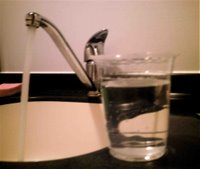Can you drink the tap water in Hong Kong?
I've heard conflicting stories about whether the tap water in Hong Kong is safe to drink. Some say it is, some say it's not: that you have to boil it to get rid of the germs. "Let's Go"'s guide to Hong Kong says that it depends on the quality of the plumming. That could explain the varied responses.So I ask the receptionist at the NTT International House, where I'm staying, whether the tap water is safe to drink. She looks a bit shocked, and says, "Wha? No, you have to boil it first." So I decide that in this case, I should be boiling my water. I also notice there's a water boiler apparently for this purpose already in the room. At first I thought it was for coffee and tea, and it probably is, but I noticed that unlike coffee makers, this just pours out hot water.
So I began to boil my water, and I even get a pitcher so I can cool the boiling water off in the refrigerator. But I started seeing signs that perhaps this was unnecessary.
1. No one was getting traveller's diarrhea. Usually in a group of 12 students, we would expect at least someone to be careless over the span of several weeks, or at least eat at a restaurant that was sufficiently careless. Especially since some of them thought it was fine to drink tap water when they first arrived (and locals set them straight, but not immediately). And one would expect that someone would be incapacitated enough for others to know about it. Now Jenna was in the hospital for food poisoning last week, but that was a case that seemed too severe to be just problems with the water. Typically bad water might give you the runs, but not put you in the hospital feeling sick.
2. When we went to Monkey Mountain last month (a place where wild monkeys come up to humans and beg for food) we ran across a reservoir and a water pumping station which was unlocked (?!) and we saw signs in English for things like "Chlorination area". So Hong Kong is not as lax with its germs as we were led to believe.
3. As evidence that Hong Kongers can sometimes be overly cautious, a few locals have been worried about the sanitation of utensils at nice restaurants. The restaurant brings out hot water before the meal, and the local might pour some in a cup, then put the chopsticks in, apparently to sterilize it. If you don't do the same, the local may be worried for you, and put your chopsticks in, too. I understand this for sketchy hole-in-the-wall places, but one local did this at the nice seafood restaurant on the HKBU campus. This is a minority of locals that do this at nice places, but it's evidence that it's not unreasonable that Hong Kongers were just being overly cautious when they say you have to boil your tap water to drink it. Note that in washing dishes, the main issue is not sterilization: to kill bacteria you need water that is generally much, much, hotter than what is typically available. Rather, the idea is to physically remove bits of stuff from the utensils, and water is a solvent.
4. The idea of boiling water because of bad pipes doesn't even make sense. Bad pipes may contribute rust, but typically not bacteria. I remember being an undergrad in Boston and the water would sometimes come out brown. I just waited a few seconds for the water to clear, and drank it all the same. I may have ended up with a higher intake of dietary iron, but I didn't get sick because of it.
Put this together with the fact that some Hong Kongers say it's fine to drink the water, and I'm left very skeptical about the idea that I have to boil my water to drink it.

So I'm going to do my next adventure. For the sake of scientific exploration, and to entertain you, my audience, I have been drinking tap water unboiled for the past few days, and will continue to do so until any bad consequences ensue.
So far, there are no problems. The water tastes fine, or at least it's as reasonable-tasting as tap water in Los Angeles. And no traveller's diarrhea yet. I did choose to do this experiment when I wouldn't be on trips or have to be at a long event (like a Gala dinner). But I'll update you on the progress of this as time goes on.


1 Comments:
You show em' Dr. Iga!
Post a Comment
<< Home